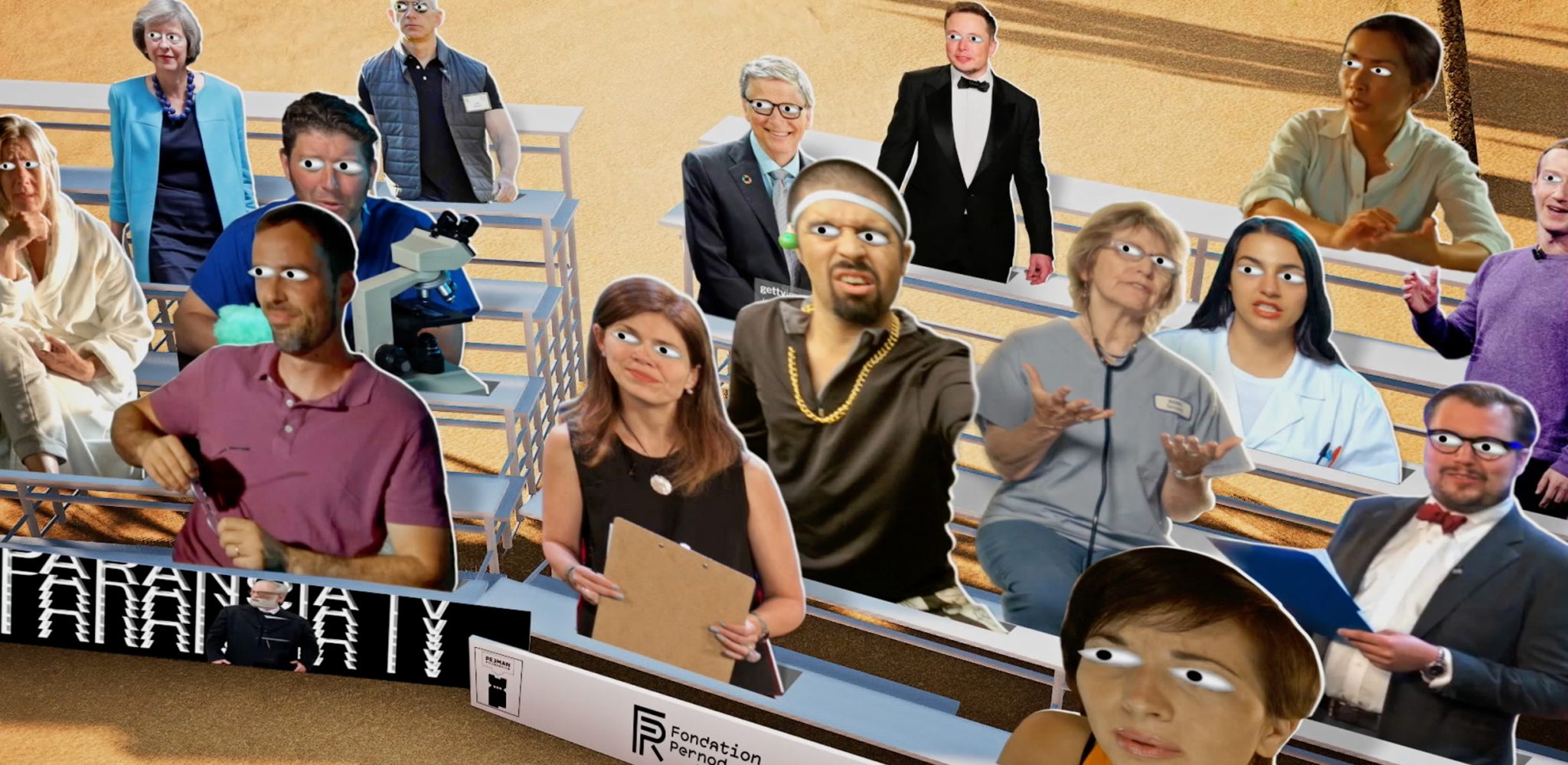The artist’s gaming experience offers cathartic moments of comic-relief
“Everybody keep calm. He’s having a hallucination,” chants the computerised voice in the jingle of Neïl Beloufa’s weirdly prophetic miniseries Screen Talk. “And so are you,” it wraps up. Originally shot in 2014 as a satirical speculative-fiction during the H1N1 crisis, the work tells the story of a world in the throes of a mysterious hallucination-inducing pandemic, where people stay at home and chat via Skype (it’s the pre-Zoom era, after all), the media spread fear and misinformation, and a bunch of opportunistic epidemiologists compete to find a cure for the virus. So, naturally, when reality caught up with fiction the French-Algerian artist couldn’t resist reviving the project, which he recast as a series of miniepisodes integrated within a zany interactive web-based platform. Reminiscent of app games with levels and a progress map, it requires the viewer to complete apparently silly games and quizzes to move to the next episode and earn points. And, as we all know, points make ‘prizes’ (more about that later). The whole experience is delightfully hysterical and, as with any good satire, provides something that feels cruelly lacking during this crisis: a cathartic moment of comic-relief in a general climate of anxiety and boredom.
Screen Talk, the platform, was released last year, but I have found myself giggling anew as I navigate the revamped, glitchier and more mobile-friendly version (think 1990s web-design meets Candy Crush) that Beloufa has developed on the occasion of his current survey at Milan’s Pirelli Hangar Bicocca. In both versions, the setup of the story remains vaudevillesque: we follow two incompetent and egocentric doctors who brandish their Ivy League degrees and throw out gibberish percentages about the validity of their cure to an uninformed and increasingly paranoid committee; one of them, Dr Martin, has placed his wife in quarantine in their flat, referring to her as ‘patient zero’ (“Trust me, I’m a doctor… you’ll be this century’s martyr”) and pretending that he’s in a distant lab, when in reality he’s in the same building, with his collaborator and lover, Dr Suki; Martin’s son, Preston, is struggling with depression after failing his medical exams and getting dumped by his long-distance girlfriend; Martin’s wife is chain-smoking and binge-watching rom-coms while trying to save her son from failure and being abused emotionally by her own mother.

Beyond the prophetic storyline, what makes Screen Talk so refreshing is that it feels like a creative and critical attempt to engage with the digital sphere. Ironically, the artist has long been intrigued by the way we interact with the ever-growing flow of digital images and information, and found himself trying to translate these virtual dynamics into the physical space: his 2018 Palais de Tokyo show saw him create a scenography device, where works of art, documents, images, artefacts, reproductions and objects are constantly shifting along robotic rails according to an algorithmic programme, in a vertiginous reappraisal of questions of hierarchy and authority. Similarly, in his Pirelli Hangar Bicocca survey, three ‘hosts’ speak to the visitor, competing for their attention like algorithms, acting out the abstract, often hidden online mechanisms tampering with our choices.
Screen Talk, on the other hand, was conceived for the internet (as opposed to treating it as a repository of lesser versions of the real thing) without sacrificing ambition or criticality (as opposed to, well, meme art). The result is a playful awareness of the language and rituals of the world Screen Talk inhabits, which leads us to question (not without cynicism) our own participation in it: after Preston gets dumped, we’re asked to play ‘expunge your ex’, deleting all pics of him from his girlfriend’s Instagram account; a CAPTCHA game asks you to spell out ‘buy stuff’, ‘hallucinations’ and ‘eat shit’; another game asks you to match a character with a targeted popup ad based on their recent search history. Elsewhere, you’ll have to find Dr Martin’s login code for a ‘Screentalk’ page that looks suspiciously like a Netflix one: as the artworld slowly transitions online, the parallel with the streaming giant and its monopoly over the film industry raises further questions about what the online production and distribution of art might look like, and how we might imagine a more decentralised ecosystem that allows for more diversity.

All the while, the players accumulate tokens (Sand Stocks), to be exchanged for NFTs designed by Beloufa and integrated using The Sandbox, which allows players to monetise their gaming experience on the Ethereum blockchain. As my dopamine levels threatened to drop dramatically, I headed to the shop to spend my well-earned 14,000 SAND (that’s how much two hours of my online attention are worth), and splashed some of it on one of the print-and-assemble-at-home ‘artist editions’ on offer (I am to receive it by email, along with a digital certificate secured by Verisart technology). The resulting image is Beloufa’s ultimate twist: a very real, smallscale paper model of a computer propped up on a desk, a mise en abyme of sorts, to be assembled with my own hands like some existential homework. Irony truly is a cure to our cynical world…
The new version of Screen Talk is currently hosted on the website of Hangar Pirelli Bicocca
